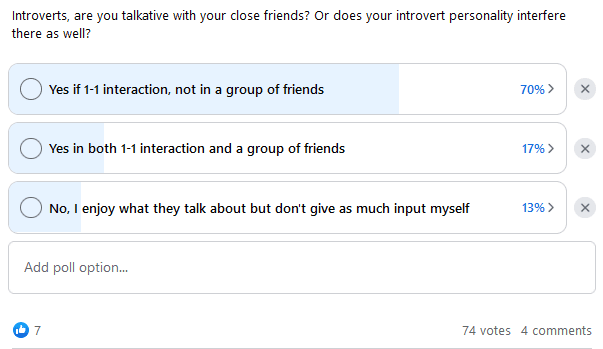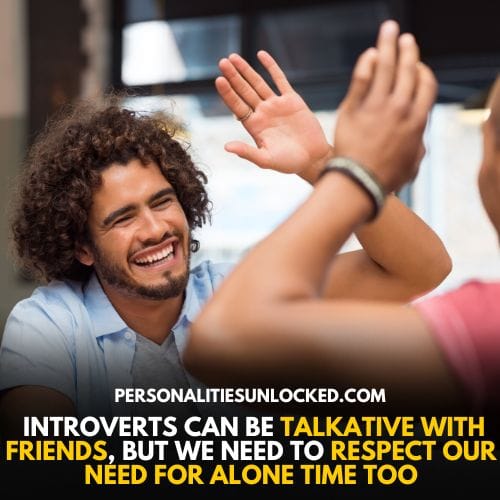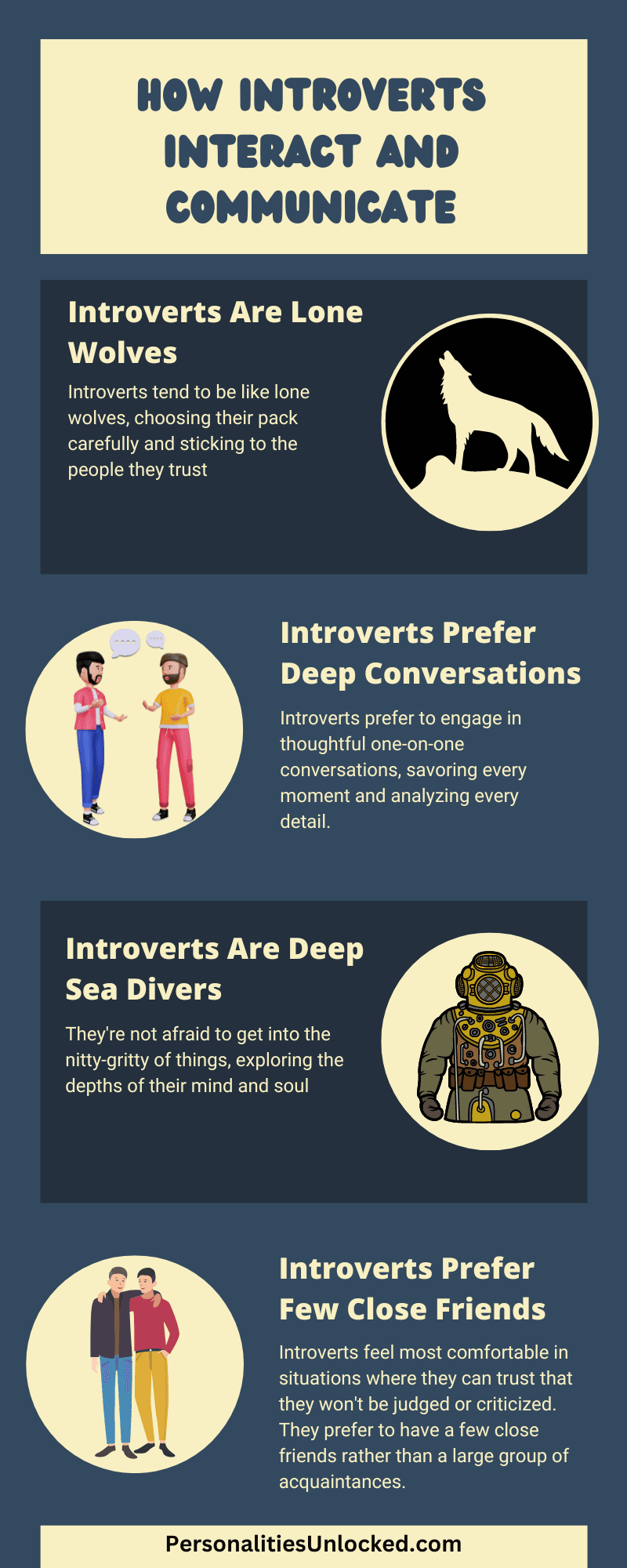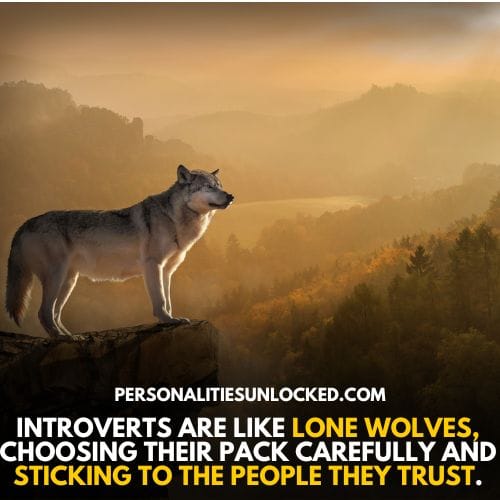Are introverts talkative with friends? Well, that’s a complicated question, isn’t it? It’s not like introverts have a secret switch that they flip to “extrovert mode” when they’re around their close friends. But, there are definitely times when introverts are more likely to come out of their shells and let loose.
In this blog post, we’ll explore the nuances of introversion and friendship. We’ll break down why some introverts might be chattier around certain people, and what that means for their overall personality. So grab a cup of tea, settle in, and let’s delve into the intriguing world of introverts and socializing.
Are introverts talkative with friends? To What Extent?
First, it’s important to understand what introversion really means. Contrary to popular belief, introversion isn’t just shyness or social anxiety. It’s a personality trait that’s characterized by a preference for solitude, introspection, and a low threshold for stimulation. Introverts tend to recharge their batteries by spending time alone or engaging in quiet, low-key activities.
Now, when it comes to being talkative with friends, the answer can vary depending on the individual introvert and the specific context. Some introverts may be naturally more talkative than others, while others may be more reserved. Additionally, an introvert’s comfort level and trust with their friends can play a significant role in how talkative they are.
However, most introverts prefer 1-on-1 interaction, even if they’re with close friends.
I asked 74 introverts this exact question ‘Are Introverts Talkative With Close Friends? and here’s what I found:

- As per the findings, 70%, or 52 introverts in this survey prefer 1-on-1 interaction with friends, and not in a group of them.
- 17% or 13 introverts have no problem in both 1-on-1 or group interactions.
- And the remaining 12% introverts don’t talk whether in groups or 1-on-1 interactions, they just enjoy listening to what the other person has to say.
In general, introverts tend to value deep, meaningful conversations over small talk and surface-level chit-chat. So, when an introvert spends time with close friends they trust and feel comfortable with, they may be more inclined to open up and engage in longer and more in-depth conversations. However, if they’re in a large group or around people they don’t know well, they may feel more inclined to listen and observe rather than contribute to the conversation.
It’s worth noting that introverts also tend to be good listeners and often provide thoughtful and insightful feedback in conversations. This can be a valuable asset in friendships and other relationships.
Overall, the extent to which introverts are talkative with friends can depend on various factors, including their individual personality, the nature of the friendship, and the social context. However, when introverts do engage in conversation with close friends, they often bring depth, thoughtfulness, and a unique perspective to the discussion.

Why Some Introverts Are Not Highly Spoken Even Among Friends:
First of all, it’s essential to recognize that introversion is a spectrum, and not all introverts are the same. Some may feel more comfortable and confident in social situations and are naturally more talkative, while others may be more reserved and prefer to listen rather than speak.
That being said, there are several potential reasons why some introverts may not be highly spoken, even among friends. Here are a few possibilities to consider:
- Processing Time: Many introverts tend to think deeply and process information internally before speaking. This can make it challenging to jump into a conversation quickly, especially in a group setting where multiple conversations may happen simultaneously. By the time an introvert has formulated their thoughts and is ready to speak, the conversation may have moved on to a different topic, or they may feel like their contribution is no longer relevant.
- Overthinking: Along the same lines, introverts may be more prone to overthinking what they want to say, worrying about how it will be received or if it’s “good enough.” This can cause them to hold back or avoid speaking altogether, even if they have something valuable to add to the conversation.
- Anxiety: Even among friends, social anxiety can be a significant hurdle for introverts. Fear of judgment or rejection, concern over saying the wrong thing, or simply feeling uncomfortable in social situations can all contribute to an introvert’s reluctance to speak up.
- Dominant Personalities: In some cases, an introvert may find it challenging to get a word in edgewise in conversations with more dominant or talkative personalities. This can be especially true in group settings where extroverts may naturally dominate the conversation.
Of course, these are just a few potential reasons why some introverts may not be highly spoken, even among friends. It’s essential to remember that everyone is unique, and there’s no right or wrong way to be an introvert. Some introverts may feel more comfortable and confident in one-on-one conversations, while others may prefer to communicate through writing or other forms of expression.
The most important thing is to honor your own needs and preferences, whatever they may be. If you’re an introvert who struggles to speak up, try to give yourself grace and recognize that it’s okay to take your time and choose your words carefully. And if you’re an extrovert who has introverted friends, be patient and understanding, and allow them the space and time they need to feel comfortable contributing to the conversation.

How Does Their Communication Level Compare to Extroverts?
Alright, introverts and extroverts, gather around! Let’s talk about how our communication styles compare. It’s not a black-and-white issue, but here are some things to consider:
Social Butterfly or Lone Wolf
Introverts tend to be like lone wolves, choosing their pack carefully and sticking to the people they trust. They may be a bit shy and reserved when meeting new people but open up like a blooming flower when around those they are comfortable with. On the other hand, extroverts are more like social butterflies, flitting from one conversation to the next and making friends wherever they go.
Conversation Flow
Introverts prefer to engage in thoughtful one-on-one conversations, savoring every moment and analyzing every detail. They’re like master chefs in the kitchen, taking their time to craft the perfect conversation recipe. Conversely, extroverts prefer a more fast-paced approach, jumping in and out of conversations with the ease of a trapeze artist.
Deep Divers or Surface Skimmers
Regarding conversation topics, introverts are like deep-sea divers, diving down to the ocean floor to explore the mysteries of life. They’re not afraid to get into the nitty-gritty of things, exploring the depths of their mind and soul. Conversely, extroverts are more like surface skimmers, skimming the waves of small talk and chit-chat, never diving too deep or staying in one place for too long.
Comfort Zone
Introverts feel most comfortable in situations where they know the people they’re with and can trust that they won’t be judged or criticized. They prefer to have a few close friends rather than a large group of acquaintances. Extroverts, on the other hand, feel most comfortable when they’re in the middle of a lively crowd, bouncing from person to person like a human pinball machine.
Here’s a comparison table for the communication styles of introverts and extroverts:
| Communication Style | Introverts | Extroverts |
| Social Interaction | Fewer social contacts, more selective, reserved in larger groups or with new people | A larger circle of friends, more outgoing and expressive with new acquaintances |
| Conversation Style | Prefer one-on-one conversations, more thoughtful and analytical, take their time before offering input | More spontaneous and direct, comfortable jumping into conversations and offering their opinion |
| Comfort Level | More comfortable with people they know well, willing to engage in intimate conversations about deeper topics | More inclined to engage in lighthearted conversations about trivial matters, comfortable in lively crowds |
| Communication Challenges | May become overwhelmed or exhausted in situations requiring excessive enthusiasm or engagement | May become bored or restless in quieter or more introspective settings |
So, as you can see, introverts and extroverts communicate in very different ways. Neither is better or worse, just different. So, let’s all just embrace our unique qualities and enjoy the conversation, no matter how deep or shallow it may be!

How Introverts Behave When Communicating With others:
Let’s get one thing straight: introverts are not all shy wallflowers who are terrified of socializing. Some may be, but many introverts are perfectly comfortable chatting it up with their friends; thank you very much.
With Strangers:
When communicating with strangers, introverts may not be as chatty. It’s not that they’re shy, per se. It’s just that they don’t typically enjoy small talk or superficial interactions. They’d rather wait to establish trust and comfort before opening up.
However, research suggests that many introverts prefer engaged listening more and also, they are much more likely to open up and chat away when they’re with people they know and trust. It makes sense when you think about it: if you feel comfortable and relaxed around someone, you’re more likely to be yourself and share your thoughts and feelings.
When it comes to strangers, though, introverts may clam up and retreat from the conversation. It’s not that they’re unfriendly or disinterested – it’s just that socializing with people they don’t know can feel a bit overwhelming and stressful.
But remember: everyone is different. Some introverts may be the life and soul of the party when they’re around strangers, while others might be perfectly content to keep to themselves. It’s all about understanding what makes you feel comfortable and finding the right balance.
With Friends:
It’s a common myth that introverts don’t like talking with their friends. When they’re with their closest pals, introverts can be as chatty and outgoing as anyone else. But why is that?
Introverts may feel more at ease in smaller, more intimate settings. When they’re surrounded by the people they trust and care about, they’re more likely to feel comfortable and relaxed enough to open up.
What’s more, introverts tend to thrive in deep, meaningful conversations. They’re the kind of people who love to dive into big ideas and thought-provoking topics. And when they’re with friends who share their interests and passions, they can get going.
Finally, introverts tend to be fiercely loyal and honest regarding their closest relationships. They aren’t afraid to speak and share their opinions, which can lead to lively and engaging debates with their friends.
So, there you have it – introverts may not always be the loudest or most outgoing people in the room, but they have plenty to say when they’re with the right people.
On an ending note, I want you to watch this video that gives some pretty useful insights to helping you be better communicator when in uncharted territories (with people you’re not really close with)
Why Introverts Should Try to Be a Little More Talkative:
Introverts, we know socializing may not be your favorite pastime, but hear us out: there are some great benefits to being a little more talkative with your closest pals. So put on your extrovert hat (or at least a slightly more outgoing one) and check out these reasons why it’s worth giving socializing a try:
1. Better Self-Discovery
When you open up to your friends, you’ll likely gain more insight into your thoughts and emotions. It’s like therapy but with less paperwork and more laughter.
2. Boosted Confidence
Sharing your ideas and opinions can be scary, but it can also be empowering with the right people. Talking with your friends can help you build up your confidence, making it easier to speak your mind in all areas of your life.
3. Deeper Emotional Intelligence
By talking with your friends and family, you get to see things from their point of view. This helps you better understand relationships and gain a more nuanced view of the world. It’s like expanding your emotional vocabulary, but with fewer flashcards and more fun.
4. More Connections and Opportunities
You never know where a good conversation might take you. Whether it’s meeting new people or learning about exciting opportunities, socializing can open up a world of possibilities. Plus, it’s a great excuse to get out of the house and try something new.
So, fellow introverts, take a deep breath and give socializing a chance. You might just surprise yourself with how much you enjoy it. And if not, the comfort of home is always waiting for you when it’s all over.

Parting Words:
The stereotype that introverts are always silent and reserved with friends is about as accurate as horoscopes. Sure, some introverts might clam up around their buddies, but others could chat for hours about anything from the latest Netflix series to the benefits of breathing exercises.
The truth is that introverts, like any other personality type, have their own unique ways of expressing themselves and communicating with others.
So, the next time you meet an introvert, don’t assume that they won’t have anything to say. Strike up a conversation and see where it takes you – you might just be surprised by how talkative they can be!
And remember, even if an introvert needs some time to recharge, it doesn’t mean they don’t value their friendships and the power of conversation.
So go ahead, introverts, let your voice be heard – you might just have something interesting to say after all!